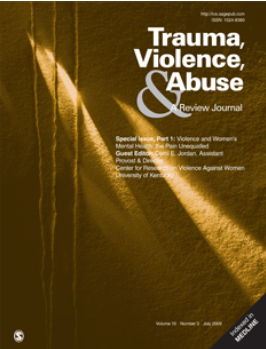Maternal Experiences of Stressful Life Events and Its Association With Teenage Pregnancy and Preterm Birth: A Systematic Review and Meta-Analysis.
IF 5.4
1区 社会学
Q1 CRIMINOLOGY & PENOLOGY
引用次数: 0
Abstract
The role that stressful life events (SLEs) play in the etiology of teenage pregnancy and adverse birth outcomes, including preterm birth (PTB), has been increasingly acknowledged in the literature. However, studies in this area have revealed inconsistent findings, and existing research syntheses have not examined the temporal relationship between major SLEs (i.e., childhood maltreatment, intimate partner violence [IPV], severe mental illness [SMI], and incarceration), and common negative pregnancy outcomes. To address these limitations, five literature databases (PsycINFO, Web of Science, PubMed, Scopus, and CINAHL) were searched for longitudinal studies examining the impact of the aforementioned SLEs on teenage pregnancy or PTB. We identified 1,540 articles; 46 articles met the inclusion criteria and were included in meta-analyses. Quality assessment of included studies was conducted. Pooled odd ratios (ORs) were calculated using random effects models, and subgroup analyses were performed to investigate the moderating effects of predefined study characteristics on the effect sizes. Statistical analyses were performed in R. Experiencing any of the SLEs explored in this meta-analysis increased the risk of teenage pregnancy (pooled ORs = 1.76; 95% CI [1.56, 1.98]). While there was no significant association between childhood maltreatment and PTB, women who had experienced any form of IPV, been diagnosed with a SMI before or during pregnancy, or been incarcerated during pregnancy, had an elevated risk of having a PTB. The findings of this study emphasize the importance of screening for SLEs across the lifespan and delivering tailored integrated responses to improve birth outcomes.母亲压力生活事件的经历及其与少女怀孕和早产的关系:一项系统回顾和meta分析。
应激性生活事件(SLEs)在少女怀孕和不良分娩结果(包括早产(PTB))的病因学中所起的作用已在文献中得到越来越多的承认。然而,这一领域的研究结果并不一致,现有的综合研究没有考察严重的重度重度重度精神障碍(即童年虐待、亲密伴侣暴力(IPV)、严重精神疾病(SMI)和监禁)与常见的不良妊娠结局之间的时间关系。为了解决这些局限性,我们检索了五个文献数据库(PsycINFO, Web of Science, PubMed, Scopus和CINAHL),以研究上述SLEs对少女怀孕或PTB影响的纵向研究。我们确定了1540个条目;46篇文章符合纳入标准,被纳入meta分析。对纳入的研究进行质量评价。使用随机效应模型计算混合奇比(or),并进行亚组分析以研究预定义研究特征对效应量的调节作用。在r中进行了统计分析。经历本荟萃分析中探讨的任何SLEs都会增加少女怀孕的风险(合并or = 1.76;95% ci[1.56, 1.98])。虽然儿童期虐待与PTB之间没有明显的联系,但经历过任何形式的IPV,在怀孕前或怀孕期间被诊断为重度精神障碍,或在怀孕期间被监禁的妇女患PTB的风险较高。这项研究的结果强调了在整个生命周期中筛查SLEs的重要性,并提供量身定制的综合应对措施,以改善分娩结果。
本文章由计算机程序翻译,如有差异,请以英文原文为准。
求助全文
约1分钟内获得全文
求助全文
来源期刊

Trauma Violence & Abuse
Multiple-
CiteScore
13.60
自引率
7.80%
发文量
131
期刊介绍:
Trauma, Violence, & Abuse is devoted to organizing, synthesizing, and expanding knowledge on all force of trauma, abuse, and violence. This peer-reviewed journal is practitioner oriented and will publish only reviews of research, conceptual or theoretical articles, and law review articles. Trauma, Violence, & Abuse is dedicated to professionals and advanced students in clinical training who work with any form of trauma, abuse, and violence. It is intended to compile knowledge that clearly affects practice, policy, and research.
 求助内容:
求助内容: 应助结果提醒方式:
应助结果提醒方式:


